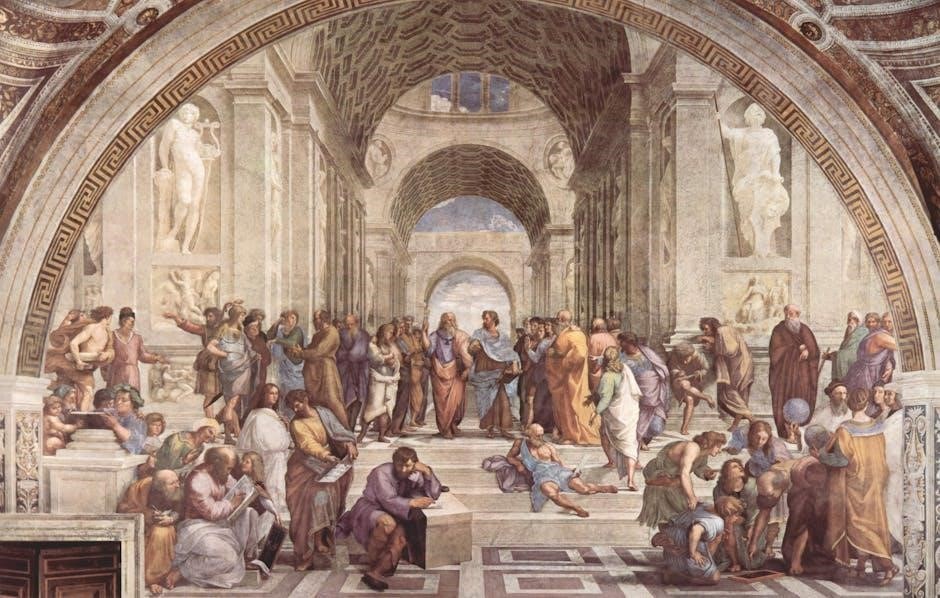Plato’s Dialogues: An Overview
Plato’s dialogues, featuring Socrates, explore ethics and philosophy. Accessible in various formats, including PDF, these works offer profound insights. Jowett’s translations make Plato palatable, impacting Western thought significantly. These dialogues present timeless wisdom.
Plato’s dialogues stand as cornerstones of Western philosophy, presenting profound inquiries into ethics, metaphysics, and epistemology. These dramatic, literary, and philosophical texts feature Socrates as a central character, engaging in thought-provoking conversations. These dialogues showcase Plato’s unique blend of philosophical depth and literary artistry.
Several dialogues, including the Euthyphro, Apology, Crito, Phaedo, and Meno, exemplify Plato’s early explorations of ethical terms and fundamental questions. The dialogues are available in various formats, including PDF, facilitating accessibility and study. Translations, such as those by Benjamin Jowett, have played a crucial role in popularizing Plato’s ideas, making them accessible to a wider audience.
Plato’s dialogues continue to influence contemporary thought, inviting readers to engage with enduring questions about justice, virtue, and the nature of reality. They offer a powerful combination of linguistic beauty and moral character.

Key Dialogues and Their Themes
Plato’s dialogues, featuring Socrates, delve into key themes. Apology defends Socrates. Crito explores justice. Phaedo discusses immortality. Euthyphro defines piety. Meno examines virtue. These dialogues shape Western thought.
The Apology: Socrates’ Defense

The Apology presents Socrates’ defense during his trial. This dialogue, though not a verbatim report, is a composition showcasing Plato’s style. Socrates defends himself against accusations of corrupting the youth and impiety. He asserts his dedication to truth and virtue, even in the face of death.
Socrates clarifies his philosophical mission, emphasizing self-examination and the pursuit of wisdom. He argues that fearing death is irrational, as no one knows what awaits in the afterlife. Socrates maintains his innocence, refusing to compromise his principles to escape punishment. His unwavering commitment to justice and truth resonates throughout the dialogue.
The Apology is divided into three parts, beginning with his formal defense. Socrates’ address highlights the importance of moral integrity and philosophical inquiry. Plato makes it clear that he was present at the trial, adding to the account’s credibility and impact on readers.

Crito: Justice and Obedience to Law
Crito explores justice and obedience to law as Socrates awaits execution. His wealthy friend, Crito, tries to persuade him to escape. Crito argues it’s unjust for Socrates to die when he can be saved.
Socrates, however, refuses, prioritizing moral principles over self-preservation. He argues that escaping would violate the laws of Athens, even if unjustly applied. Socrates believes that one must respect the social contract, even when it leads to personal harm. He reasons that undermining the law weakens the state and sets a bad example.
Socrates considers the long-term implications of his actions, valuing justice above his own life. His commitment to ethical conduct remains steadfast, shaping his decision. He envisions the Laws of Athens confronting him, questioning his loyalty. This dialogue highlights the conflict between individual rights and societal obligations, showcasing Socrates’ unwavering moral compass.
Phaedo: Immortality of the Soul
Phaedo delves into the immortality of the soul, set during Socrates’ final hours. Socrates engages in philosophical discussions with his friends, exploring the nature of life and death.
He presents arguments for the soul’s immortality, including the cyclical argument, the theory of recollection, and the affinity argument. The cyclical argument suggests life comes from death, and death from life, in a continuous cycle.
The theory of recollection posits that learning is remembering what the soul knew before birth. The affinity argument claims the soul is more like the eternal Forms than the changeable body. Socrates comforts his companions, viewing death as a release from the body’s limitations.
He believes philosophy prepares one for death by detaching the soul from bodily desires. Phaedo explores profound questions about existence, offering solace and philosophical insights. Socrates faces death with serenity, confident in the soul’s eternal nature.
Euthyphro: Defining Piety
Euthyphro features Socrates questioning Euthyphro about the nature of piety. Set outside the Athenian court, Socrates seeks a clear definition of piety as Euthyphro is prosecuting his own father for manslaughter.
Socrates challenges Euthyphro’s various attempts to define piety, revealing contradictions and inconsistencies in his reasoning. Euthyphro initially defines piety as prosecuting wrongdoers, like himself.
Socrates points out that this is merely an example, not a universal definition. Euthyphro then suggests that piety is what is loved by the gods. Socrates raises the question of whether something is pious because the gods love it, or whether the gods love it because it is pious. This dilemma highlights the problem of grounding morality in divine authority.
The dialogue ends without a satisfactory definition, illustrating the difficulty of defining abstract concepts. Euthyphro exemplifies Socrates’ method of inquiry and challenges conventional beliefs about religion and ethics.
Meno: Virtue and Knowledge
In Meno, Socrates engages with Meno to explore whether virtue can be taught, acquired by practice, or comes by nature. Meno initially proposes various definitions of virtue, each of which Socrates refutes through rigorous questioning.
Socrates introduces his theory of reminiscence, suggesting that learning is actually a process of recollecting knowledge the soul possessed before birth. To illustrate this, Socrates questions a slave boy, guiding him to discover a geometrical truth without directly teaching him.
This demonstrates that the boy already possessed the knowledge, albeit unconsciously.
The dialogue then shifts to examining whether virtue is knowledge. Socrates argues that if virtue is knowledge, it can be taught. However, he notes the difficulty in finding reliable teachers of virtue, leading him to consider whether virtue might be a matter of true belief rather than knowledge.

The dialogue concludes inconclusively, leaving the reader to ponder the relationship between virtue, knowledge, and true belief, and how virtue is acquired.

Translations and Accessibility

Plato’s dialogues are widely accessible through various translations, including Benjamin Jowett’s. Many dialogues are available in PDF format, facilitating easy access for study and exploration of Plato’s philosophical ideas.
Benjamin Jowett’s Translations
Benjamin Jowett’s translations of Plato’s dialogues have been instrumental in popularizing Plato’s works. His translations aimed to make Plato’s complex philosophical ideas understandable and accessible to a wider audience, particularly the rising middle class. Jowett’s approach involved compromises to align with societal norms, making the text readable and palatable.
While Jowett’s translations are celebrated for their readability, some critics argue that they sometimes sacrificed accuracy for clarity. Despite this, his versions remain influential. Jowett’s work ensured Plato’s enduring impact. His translations fostered a greater appreciation for Plato’s contribution to Western thought, enabling generations to engage with these foundational texts.
Availability of Plato’s Dialogues in PDF Format
Plato’s dialogues are widely available in PDF format, offering convenient access to these philosophical texts. Numerous websites and online libraries host collections of Plato’s dialogues, including complete works and selections. These digital versions make it easy for students, scholars, and general readers to study and enjoy Plato’s writings.
Many PDF versions are based on classic translations, such as those by Benjamin Jowett, ensuring that even older translations are easily accessed. Some online resources also provide PDFs of collected dialogues, offering a comprehensive compilation. The accessibility of Plato’s dialogues in PDF format helps to continue his legacy.

Significance and Influence
Plato’s dialogues profoundly influenced Western thought, shaping philosophy and ethics. Socrates’ role, as depicted by Plato, highlights moral beauty. His works remain significant, impacting modern discourse and understanding. Plato’s dialogues are a powerful combination.
Plato’s Impact on Western Thought
Plato’s dialogues have had a monumental impact on Western thought, shaping philosophical discourse for centuries. His exploration of ethics, knowledge, and governance, particularly in works like “The Republic,” has provided a foundation for political theory and moral philosophy. Plato’s dialogues introduced concepts like the theory of Forms, which profoundly influenced metaphysics and epistemology.
His writings inspired countless thinkers, from ancient philosophers to modern scholars. The dialogues, featuring Socrates as a central figure, emphasize reason and critical thinking. Plato’s influence extends to literature, art, and even religious thought. His ideas continue to be debated and reinterpreted, demonstrating their enduring relevance.
Plato’s work encourages a pursuit of wisdom and justice, shaping Western values and intellectual traditions. Available in various formats, including PDF, his dialogues remain accessible for modern readers, ensuring his ideas continue to inspire future generations.
The Role of Socrates in Plato’s Dialogues
Socrates plays a pivotal role in Plato’s dialogues, serving as the central figure and primary voice for Plato’s philosophical ideas. Though the beauty of language is certainly Plato’s, the moral beauty belongs to Socrates. He is depicted as a relentless seeker of truth, engaging in dialogues that challenge conventional wisdom and explore fundamental questions of ethics and knowledge.
Socrates’ method of questioning, known as the Socratic method, drives the philosophical inquiry within the dialogues. He probes the definitions of virtues like justice, piety, and courage, pushing his interlocutors to examine their beliefs. While Plato was present at the trial, Plato doesn’t directly report what Socrates said, but elaborates.
Through Socrates, Plato presents his own philosophical perspective, exploring concepts such as the theory of Forms and the nature of the soul. The dialogues become a medium through which Plato immortalizes Socrates’ ideas and teachings, shaping Western philosophical tradition. Socrates’ character embodies the pursuit of wisdom and the importance of critical self-examination.

Further Exploration
Collected dialogues editions offer comprehensive access to Plato’s works. These editions compile authentic dialogues alongside spurious works. Exploring these collections deepens understanding of Plato’s philosophical range and Socrates’ enduring influence on Western thought.
Collected Dialogues Editions
For those seeking a comprehensive collection of Plato’s works, several collected dialogues editions are available. These editions typically include not only the authentic dialogues widely attributed to Plato but also works considered spurious or of doubtful authorship. Obtaining a collected edition can be a more efficient way to access a broad range of texts associated with Plato, compared to searching for individual dialogues.

Some notable collected editions include “The Collected Dialogues of Plato,” edited by Huntington Cairns, which provides a comprehensive compilation of Plato’s writings in English. These editions often feature detailed introductions and notes, offering valuable context and analysis for readers. Furthermore, collected editions may present different translations of the dialogues, allowing readers to compare interpretations and gain a richer understanding of Plato’s ideas.
Exploring these collected editions allows readers to delve deeper into Plato’s philosophical landscape, examining the evolution of his thought and the diverse perspectives presented within his dialogues. Whether for academic study or personal enrichment, collected dialogues editions serve as invaluable resources for anyone interested in engaging with Plato’s enduring legacy.
